World Economic and Social Survey Archive: 1980-1989
1989
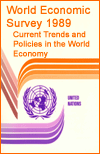 World Economic Survey 1989—Current Trends and Policies in the World Economy
World Economic Survey 1989—Current Trends and Policies in the World Economy
According to World Economic Survey 1989, global economic growth in 1988 confounded expectations. Not only was the expansion of world output larger than expected, but international trade and investments grew vigorously. However, this expansion failed to spread to many developing countries, particularly those in Africa and Latin America, which continued to stagnate or to grow very slowly. Three special issues are discussed in the final portion of the Survey: the socio-economic attainment of women; the early identification, analysis and monitoring of world economic developments; and selected demographic indicators.
1988
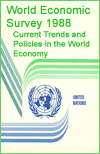 World EconomicSurvey 1988—Current Trends and Policies in the World Economy
World EconomicSurvey 1988—Current Trends and Policies in the World Economy
World Economic Survey 1988 highlights the dramatic financial shocks and instability in primary commodity markets, including oil, in 1987, which seem to have had only minor repercussions on the growth of output. The Survey includes a comprehensive analysis of the effects of the indebtedness and persistent fiscal and external imbalances of developed countries on the global environment and, in particular, on the development process of developing countries.
1987
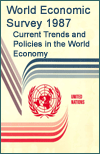 World Economic Survey 1987—Current Trends and Policies in the World Economy
World Economic Survey 1987—Current Trends and Policies in the World Economy
According to World Economic Survey 1987, the modest expansion that characterized the world economy during most of the first half of the 1980s persisted in 1986. Inflation has decelerated considerably and industrial countries are entering their fifth year of expansion, though at a slow pace. Indeed, the world economy appears to be set in a slow growth path, which is likely to delay the great adjustments required at the national and international levels.
1986
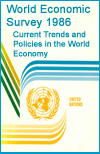 World Economic Survey 1996—Current Trends and Policies in the World Economy
World Economic Survey 1996—Current Trends and Policies in the World Economy
In addition to the discussion of current trends and policies in the world economy, World Economic Survey 1986 contains three special chapters (V, VI and VII): chapter V covers the increasingly clear interactions between systemic issues in trade, money and finance; chapter VI covers the effects of adjustment policies on capital formation in developing countries, centrally planned economies and some major developed market economies; and chapter VII covers the major development challenge posed by the economic crisis in sub-Saharan Africa.
Supplement to World Economic Survey 1985–1986
The Supplement to World Economic Survey 1985-1986 comprises four studies: international monetary reform and the socialist countries; the changing institutional character of international financial markets in the 1980s; countertrade in developing countries; and problems and polices of countries affected by desertification and drought.
1985
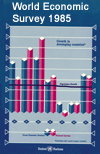 World Economic Survey 1985—Current Trends and Policies in the World Economy
World Economic Survey 1985—Current Trends and Policies in the World Economy
The crucial role of international trade in reinforcing global demand was evident in 1984, as the growth of world output gradually regained the pace of the late 1970s. Yet the geographical spread of the recovery remained limited, and economic growth in half of the developing countries was still so low that income per capita either continued to fall or stagnated. This uneven recovery, its sources and the policies conditioning its transmission, as well its short-term prospects, are the focus of World Economic Survey 1985.
1984
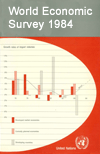 World Economic Survey 1984—Current Trends and Policies in the World Economy
World Economic Survey 1984—Current Trends and Policies in the World Economy
After the most protracted global economic recession since the 1930s, the prospects for sustained and broad-based growth are still not satisfactory. This unresolved issue is the focus of World Economic Survey 1984. A major development in 1983 was the recovery in North America. The recovery of the developed market economies as a whole is expected to become more widespread this year, but further strengthening beyond 1984 is uncertain.
 Supplement to World Economic Survey 1984
Supplement to World Economic Survey 1984
The Supplement to World Economic Survey 1984 comprises three studies: exchange rate volatility in an interdependent world economy; some changes in trade among developing countries, 1965-1980; and wage behaviour in the developed economies.
1983
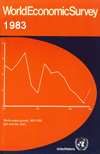 World Economic Survey 1983—Current Trends and Policies in the World Economy
World Economic Survey 1983—Current Trends and Policies in the World Economy
According to World Economic Survey 1983, the world economy remained in the grip of recession during 1982 and is only now beginning, in a few places, to show some signs of recovery. The unexpectedly severe contraction in demand that ensued from the anti-inflationary policies set in train by major industrial countries in 1979 and 1980 had brought about a sharp curtailment in the growth of world production and trade in 1981, and the deflationary impact of such policies was aggravated in 1982. In the developing countries as a group, output failed to increase for the first time in the post-war period.
 Supplement to World Economic Survey 1983
Supplement to World Economic Survey 1983
The Supplement to World Economic Survey 1983 comprises three studies: recent experience in economic cooperation among developing countries and possibilities for progress in the 1980s; some effects of rising public expenditure in developed market economies; and the impact of workers' remittances on the balance of payments.
1981–1982
 World Economic Survey 1981–1982—Current Trends and Policies in the World Economy
World Economic Survey 1981–1982—Current Trends and Policies in the World Economy
World Economic Survey 1981-1982 observes that economic expansion decelerated markedly throughout the world in 1981. The slowdown affected all major regions and groups of countries, independently of their level of development or economic structure. The deceleration was particularly intense in the developing countries, most of which experienced a significant fall in per capita income. The major factor behind the poor performance of the world economy was the recession in the Western industrial countries, where low growth caused a rise in unemployment, downward pressure on wages, and weakening primary commodity prices.
Supplement to World Economic Survey 1981–1982
The Supplement to World Economic Survey 1981-1982 comprises two studies: Some Notes on Recent Change in Commercial Policy of Developed Market Economies" and "Medium-term Growth and Trade in the Light of the Socio-economic Development Plans of Eastern Europe and the Union of Soviet Socialist Republics for 1981-1985".
1980–1981
World Economic Survey 1980–1981
World Economic Survey 1980-1981 discusses the deterioration in the performance of the world economy in 1980, which was accompanied by a marked slowdown in the expansion of world trade, worsened imbalances in current accounts and an acceleration in the pace of inflation. Although some recovery in growth rates is anticipated beginning in late 1981, the pace is not expected to be vigorous. The poorer medium-term trend that has been in evidence since the mid-1970s is thus likely to continue.

Follow Us